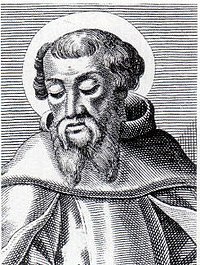St. Irenaeus of Lyon
| Saint Irenaeus | |
|---|---|

|
|
| Bishop and Martyr | |
| Born | AD 130 Smyrna in Asia Minor (modern-day İzmir, Turkey) |
| Died | AD 202 (aged 72) Lugdunum in Gaul (modern-day Lyon, France) |
| Venerated in |
Roman Catholic Church and Eastern Catholicism Assyrian Church of the East Eastern Orthodox Church Lutheran Church Oriental Orthodox Church Anglican Communion |
| Feast | June 28 (Roman Catholic Church, Anglican Communion); August 23 (Eastern Catholic, Orthodox and Oriental Churches) |
Irenaeus (/aɪrəˈniːəs/; Greek: Ειρηναίος Eirēnaíos) (died about 202) was a Greek cleric noted for his role in guiding and expanding Christian communities in what is now the south of France and, more widely, for the development of Christian theology by combatting heresy and defining orthodoxy. Originating from Smyrna, now Izmir in Turkey, he had heard the preaching of Polycarp, who in turn was said to have heard John the Evangelist.
Chosen as bishop of Lugdunum, now Lyon, his best-known work is On the Detection and Overthrow of the So-Called Gnosis, often cited as Adversus Haereses, an attack on gnosticism, in particular that of Valentinus. To counter the doctrines of the gnostic sects claiming secret wisdom, he offered three pillars of orthodoxy: the scriptures, the tradition handed down from the apostles, and the teaching of the apostles' successors. Intrinsic to his writing is that the surest source of Christian guidance is the church of Rome, and he is the earliest surviving witness to recognise all four gospels as essential.
...
Wikipedia
